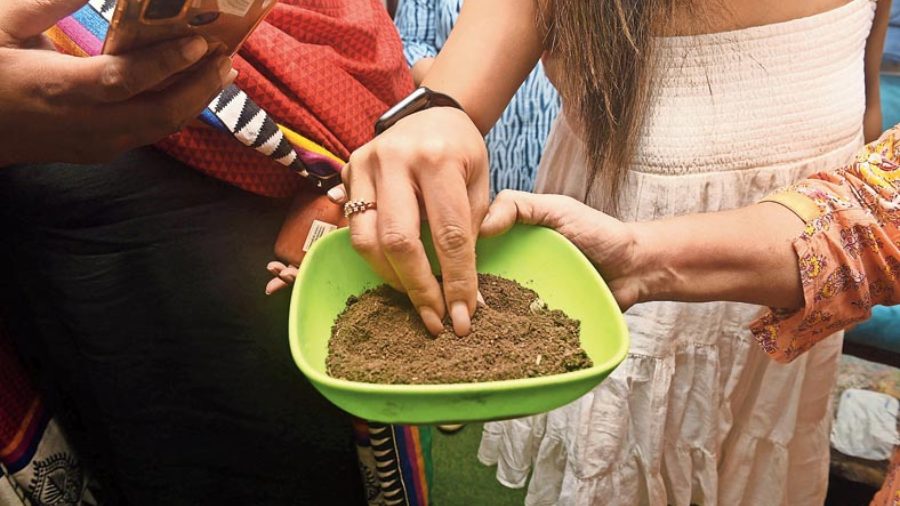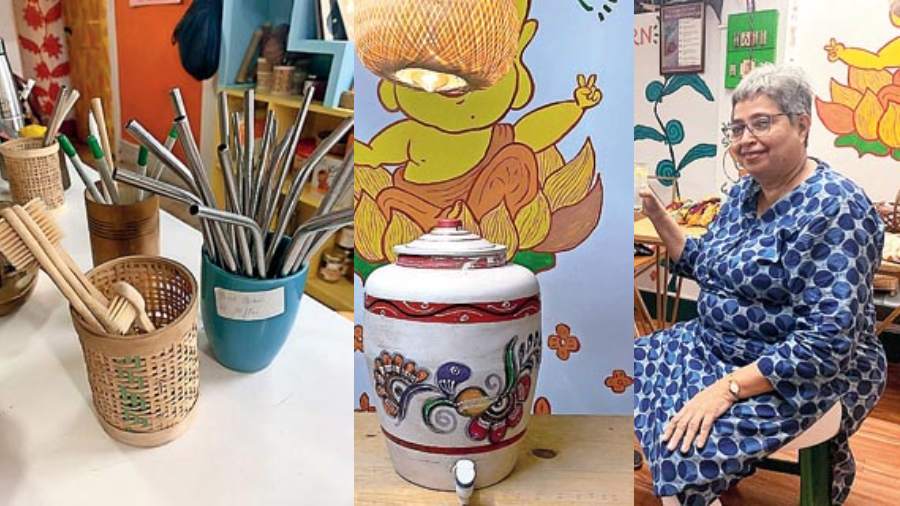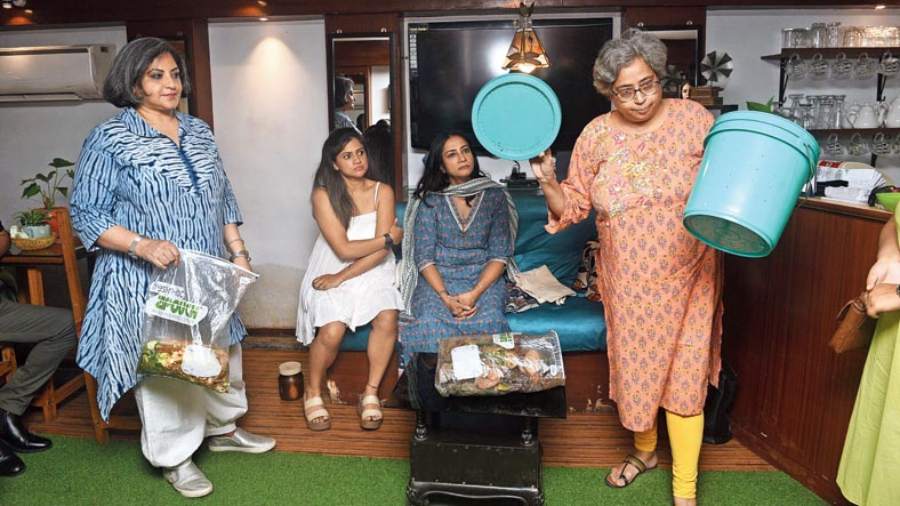In a world that is abuzz with the size-zero mantra, some of us choose a path less travelled — a zero-waste lifestyle or pursuit of that ideal. On World Nature Conservation Day today, let’s delve a bit deeper into the subject.
According to the National Restaurant Association of India (NRAI), 68 million tonnes of food is wasted every year in India. In that, Kolkata alone contributes about 5,000 tonnes every day!
Did you know that a single piece of plastic takes 15-20 years at the minimum and 1,000 years maximum to decompose into nature? Are we contributing to landfills? We need to ask ourselves what kind of waste each individual is generating each day (not taking into account medical or hazardous waste).
The way of sustainable living is an art developed to conserve natural resources and that starts with the individual and germinates into the community. To start a sustainable lifestyle we need to start from our homes.
Non-industrial waste can be broadly categorised into three kinds:
- Solid waste, such as paper, glass and so on
- Kitchen waste, such as vegetable peels, egg shells and food waste
- E-waste, such as gadgets like phones, toasters, chargers, laptops, and bulbs
It should be our individual responsibility to create a zero-waste kitchen. It is no rocket science at all. One just needs to change one’s mindset. According to Lata Bhatia, a compost expert (@zerowastelata on Instagram) and the owner of the only zero-waste store in the city named Kolkata Zero Waste Bazaar (KZWB), who conducted a composting session with members of the NGO Mrittika Earthy Talks (MET) at Wisdom Tree Cafe, one needs to follow the 5R Principle:
- Refuse
- Reduce
- Reuse
- Recycle
- Rot
Every household should mandatorily refuse and reduce use of any non-recyclable products like plastic, Styrofoam, and recycle, share, swap the rest. Responsible consumption is the key. Start by planning a weekly menu and growing at least a few herbs and potted plants at home. Most of us live in apartments but we can all use our balconies and windowsills for oxygen generators and greens. Money plants and succulents need minimum maintenance.
Rot or compost all your organic waste, which is an excellent resource for our soil. Of total household waste, 60-70 per cent comes from our kitchens in the form of peels, seeds and wasted food. Typically, for urban homes/ apartments/ complexes with green patches or gardens, the first step to composting is segregation. Dry and kitchen waste should be segregated at source.
What is Compost?
According to the EPA (US Environment Protection Agency), it is the process of feeding the soil with our kitchen waste. EPA estimates that in 2018, 2.6 million tonnes of food was composted. Mature compost is a stable material with a content called humus that is dark brown and has a beautiful earthy smell.
There are a number of benefits to compost that not everyone is aware of. Some examples are listed below:
- Compost reduces and, in some cases, eliminates the need for chemical fertilisers.
- Organic waste in landfills generates methane, a potent greenhouse gas. By composting wasted food and other organics, methane emissions are significantly reduced.
- Compost promotes higher yields of agricultural crops.
- Compost can be used to remediate soils contaminated by hazardous waste in a cost-effective manner.
- Compost can provide cost savings over conventional soil, water and air pollution remediation technologies, where applicable.
- Compost enhances water retention in soils.
- Compost provides carbon sequestration.
- Compost helps restore carbon back in the soil. Its usage reduces the need for chemical fertilisers, which emit large quantities of nitrous oxide — both during production and in application — and thereby helps mitigate emissions.
- Compost also improves moisture retention in the soil.
We are losing out on mitigation through composting because at most only two per cent of the municipal solid waste in India is composted. The Supreme Court order of 2006 directed fertiliser companies to co-market city compost with chemical fertilisers. However, the government incentive of market development assistance for city compost at Rs 1,500 per tonne to fertiliser companies is no match for the capital subsidy and transport subsidy provided to chemical fertilisers, which renders compost uncompetitive vis-a-vis chemical fertilisers.
Cafes and restaurants usually generate more waste than kitchens in homes. Wisdom Tree Cafe on Dover Road collaborated with Mrittika Earthy Talks (MET) and organised a composting session with members and guests from around the Ballygunge area. The members were divided into two groups. One group carried kitchen waste from home and the other collected dry leaves from the neighbourhood. Not only were 10 kitchens part of a zero-waste cycle, but also the vicinity of the Ballygunge neighbourhood was cleaned of fallen leaves.
Lata Bhatia took us through the 60-day composting process step-by-step with the cafe owner and also taught us the value of the zero-waste lifestyle. We will discuss several kinds of composting, both urban and rural, which is actually a form of care and compassion to the earth.

The 60-Day Composting Cycle
- Take a bucket with a lid. It should have holes for oxygen flow.
- Keep throwing your kitchen waste (nitrogen), such as peels, seeds, coffee, tea leaves, eggshells, into it.
- Cover with dry leaves, sawdust or paper scrap (carbon).
- Keep layering and stirring the bucket with waste and dried leaves till it is full.
- Keep the bucket in a dry and shaded space so that there is no ingress of moisture and the fermentation happens naturally.
- One will need three buckets in this process. By the end of 60 days, the first bucket would have decomposed into compost. Your ‘black gold’ would be ready. Mix it with your flowerpots, green patches and see them bloom.
The 10-DAY Composting Cycle
- follow this method at home as I have a small patch where I grow my organic vegetables and I also have my maali/gardener helping me. Ballygunge lanes are lined with trees. So we often pour excess compost to the trees outside.
- Take a big earthen pot/planter.
- Layer it with kitchen waste and leaves.
- You can use Cocopeat (source of carbon)
- Keep layering it.
- Pour curd water to hasten the decomposing process.
- Wear a pair of gloves and mix it well to a pulp.
- Cover it for 10 days.
- Mix it with your greens.
Composting with cow dung
In the village, our farmer friends use cow dung for composting. They dig pits in the soil where they are farming or near a cluster of homes and throw the kitchen waste in the pits, covering it with hay, which is not only the byproduct of paddy but also the fodder for the cattle even if dry leaves are not in plenty; hay is a perfect substitute of carbon. This is layered regularly and covered with cow dung.
Fermentation happens much faster as the soil mixes with the compost material. The above converts into ‘black gold’ in a month. There is no need of artificial or chemical manure. Hence what comes from the earth goes back to it
Other Methods Of Composting
Brinda Sen runs an Asian kitchen in Cambridge in collaboration with farmers. She says: “I do use bio-degradable bags. Any covered container is good as it keeps the flies out and the smell contained. I throw the garbage as and when the box gets filled and Cambridge composts what the building throws into composting.”
Rashmi Choudhury, a resident of Ballygunge, is an avid composter. She has been making floor and utensil cleaners recycling her fruit waste. These cleaning liquid enzyme need to be diluted with water for floor cleaners and dish washing.
For each bottle:
- Take a 1-litre jar
- Add 300g citrus fruit peels
- Add 100g jaggery
- Add 1litre of water
- Keep air-tight for three months and let it decompose naturally.
- Strain and use the magic potion diluted with water to clean anything!

Compost expert Lata Bhatia’s (right) Kolkata Zero Waste Bazaar offers completely recyclable items (left)
Kolkata Zero Waste Bazaar
Tucked away in a by-lane of New Alipore is a haven — Kolkata’s first and only zero-waste store started by Lata Bhatia in 2016. Conceptualised with the motto “less is more”, KZWB stores a plethora of products which are either completely washable or biodegradable and aesthetic as they are all handpicked. From innovative home decor items, hygienic recyclable baby diapers to clay hand-painted kitchenware, it epitomises a zero-waste lifestyle to the core.
It also houses the first vegan cafe, Ubuntu, made from scratch by their young environment enthusiasts. For a true-blue Bengali like me who swears by her kosha mangsho and luchi, I polished off an entire plate of the delectable alternative.
The author is the founder director, Mrittika Earthy Talks Foundation
